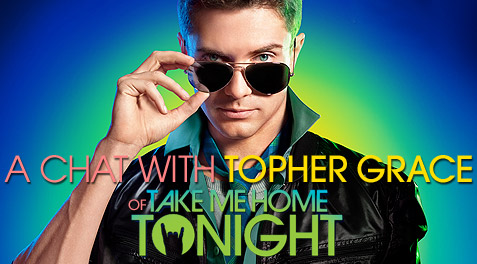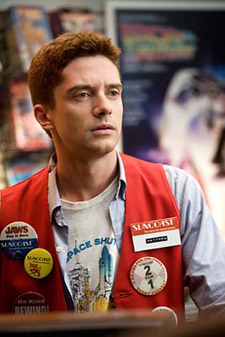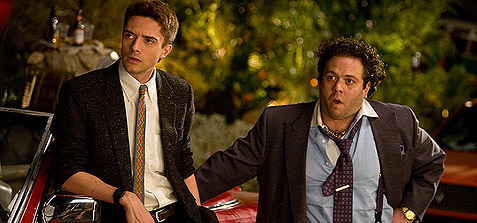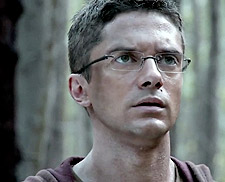
Interview Date: 02/05/2011
Run Date: 03/02/2011
Interviews Home / Movies Home / Bullz-Eye Home
As young Eric Forman on "That 70's Show," Topher Grace was the ideal anchor for the sitcom's broad humor, a straight man who was also the funniest person on the show. He was noticed, and movies came calling. After a terrific film debut as a smart-yet-idiotic young druggie in Steven Soderbergh's Oscar-winning "Traffic," and a brilliant cameo as an idiotic-yet-idiotic version of himself in "Ocean's Eleven," he starred in a pair of 2004 comedies with the potential to make a him a major movie star. "In Good Company" was a solid and thoughtful comedy, and "Win a Date With Tad Hamilton" was a fair attempt at a classic era-style rom-com, but neither effort made him a star, though his "Ocean's Twelve" claim that he had "phoned in" his performance in "that movie with Dennis Quaid" got enormous laughs in movie theaters in the Los Angeles area, at least. A few years later, Grace got the chance to invert his nice-guy persona in the most high-profile manner possible as Venom in "Spiderman 3," widely seen as as a disappointing capper to Sam Raimi's run with the soon-to-be rebooted franchise.
With the exception of a major role in 2010's "Predators," however, Grace has been largely off-screen since, though it's not because he's retreated. "Take Me Home Tonight" began life as a story Grace co-wrote with best friend and producing partner Gordon Kaywin. Directed by Michael Dowse ("FUBAR," "It's All Gone, Pete Tong") and costarring Anna Faris and Dan Fogler, it's a coming-of-age comedy that stars Grace as an engineering graduate and mathematics whiz plagued by severe post collegiate malaise and a bad job who endures romantic adversity brought on by a chance meeting with his high school crush (Teresa Palmer). Grace's movie met some serious adversity of its own when executives at Universal became antsy that an R-rated coming-of-age comedy set in 1988 would dare to depict the use of cocaine. Fortunately, Grace and company were able to attract some really high-powered Hollywood names (producers Ron Howard, Brian Grazer, and Ryan Kavenaugh), and the movie is now getting a decent wide release through Relativity Media. That's good news for everyone, because "Take Me Home Tonight" turns out to be really enjoyable and features Grace's best lead performance yet.
Still, because I try to be a professional about these things, I tried to play-down my fandom when I met with Grace at his movie's press junket.
Well, kind of.
Bullz-Eye: So I’ve been having a little Topher Grace film festival at my house…
Topher Grace: What does that include? I could only imagine.
BE: Well, 2004 was obviously a big year.
TG: That’s a pretty sad film festival.
BE: It wasn’t bad, but it is true that, up until last night, I didn’t feel like I saw "the Topher Grace movie" I've been hoping for. Now, you produced this...
TG: ...Oh that’s nice of you to say. I think I know what you’re going to say, actually. There’s a certain freedom if you produce to get deeper into the material.
BE: Yes, but a lot of actors look into producing as a way to try and take control of their career.
TG: It wasn’t about control. In a way, you have less control when you’re producing, because you’re so passionate. Because you’re in deeper, you realize how easily things can fall apart. When you’re only acting, you kind of have a mom and dad, and you can relax. But then I think that, acting-wise, it’s helped me. I knew what happened right after that scene, when they cut away. I knew what happened before that scene. And the idea kind of came out of our naked brains, so we understood the tone of it really well, too.
BE: I understand you had a week to rehearse, which is unusual.
TG: Really unusual. It’s smart, because it’s such an ensemble.
BE: Now, I have to say, I’m old enough…I don’t want to date myself completely, but…
TG: When did you graduate?
BE: I'm not telling.
TG: Oh, it must be pretty bad.
BE: (Laughing) I would be a few years older than your character.
TG: I don’t think so. Are you over 48?
BE: No.
TG: Okay, he’d be about 48 now.
BE: They were the high school class of 1984.
TG: Yeah.
BE: They would be younger than that. I was class of ’80. I just gave it away.
TG: Oh, okay. Maybe they’re a little younger.
BE: They would be about 44.
TG: Oh, I did the math wrong. This is why I only play mathematicians in films.
BE: But you really got it. I was there at…not exactly those kinds of parties, but close. And it felt like that.
TG: Thank you.
BE: So obviously you looked at a lot of movies, you've talked about John Hughes films, but did you do historical research?
 TG: It’s more interesting to talk about genre, really, than about the actual research. And there were a lot of experts that helped us. I was 10 when the film was set. There is a little bit of knowledge that you’re in a genre. I think when you look twenty years back, you have to pick a film genre and that [coming-of-age] film genre was very strong at that time. So we’ve been talking about John Hughes a lot because of that. But then there was a lot of stuff that we wanted to do that was very different from those films. The hard part was really toning down the 80's references. We just wanted a film that wasn’t making fun of the 80’s. Yet there was a lot of great stuff going on then. This kind of genre is specific. If there’s a genre of movies looking back on one night -- the “Dazed and Confused," “American Graffiti” type of movie -- then this would be one. I think both of those two movies, and this one, have a modern day protagonist. There’s no way to prove it, but I think that the character Ron Howard played in “American Graffiti” was probably closer to someone who was living post-Vietnam. Films are set in the past for a reason. There’s a lot more of an awareness of what’s happening. I think that Matt Franklin is a modern day protagonist and would be doing much better now. If he lived with his folks [today], it wouldn’t be that big of a deal because he just graduated college. He’s a real ugly duckling in the 80’s. I think you have to start with a character that is the opposite of that time.
TG: It’s more interesting to talk about genre, really, than about the actual research. And there were a lot of experts that helped us. I was 10 when the film was set. There is a little bit of knowledge that you’re in a genre. I think when you look twenty years back, you have to pick a film genre and that [coming-of-age] film genre was very strong at that time. So we’ve been talking about John Hughes a lot because of that. But then there was a lot of stuff that we wanted to do that was very different from those films. The hard part was really toning down the 80's references. We just wanted a film that wasn’t making fun of the 80’s. Yet there was a lot of great stuff going on then. This kind of genre is specific. If there’s a genre of movies looking back on one night -- the “Dazed and Confused," “American Graffiti” type of movie -- then this would be one. I think both of those two movies, and this one, have a modern day protagonist. There’s no way to prove it, but I think that the character Ron Howard played in “American Graffiti” was probably closer to someone who was living post-Vietnam. Films are set in the past for a reason. There’s a lot more of an awareness of what’s happening. I think that Matt Franklin is a modern day protagonist and would be doing much better now. If he lived with his folks [today], it wouldn’t be that big of a deal because he just graduated college. He’s a real ugly duckling in the 80’s. I think you have to start with a character that is the opposite of that time.
BE: There is a similar conflict with your character and Richard Dreyfuss deciding whether or not he wanted to stay in town or go away to college. Regarding that 24 hour time period, you probably know this, but it’s one of the Aristotelian unities of time and place.
TG: What was that?
BE: Aristotle. He suggested all plays should take place over not more than 24 hours.
TG: Oh, I didn’t know that. That’s funny.
BE: It gives it an intensity.
TG: You’re right, and we thought about that right at the beginning. That’s why they are our favorite movies, because you go on an adventure and you are in the adventure with the main character and with the other characters. You never leave them for too long...Everything is perceived as being the present, and you’re riding with the characters.
BE: I noticed that you used the “Less Than Zero” house.
TG: Yeah, we tried to find one that was close to it.
BE: It wasn’t the actual house?
TG: No, it was in Arizona.
BE: You fooled me.
TG: No. Thank you, we really tried to get as close as possible. The director would love hearing you say that.
BE: He fooled me. I was absolutely convinced you had found it. It looked exactly the same to me.
TG: Yeah, well, a lot of the houses up here do kind of look like the “Less Than Zero” house. But we wanted to have a real [difference between the party Beverly Hills and the one in] the Valley, which was a big deal in the 80’s. There’s a real Valley party that is kind of more of a community, and then they go over the tracks to Beverly Hills and it’s a very different scene there.
BE: Right. But, yeah, I was convinced; I was absolutely convinced.
TG: Thank you.
BE: I was devastated when I went to see “Oceans Thirteen,” and you weren't in it.
TG: I can tell you what we were going to do -- I couldn’t do it because of “Spider-Man”.
BE: Right, I know that.
TG: I talked to Steven [Soderbergh], and we had a bit planned. In the first one, he’s teaching me to play cards. In the second one, Brad is coming to this hotel, and I’ve trashed the hotel room. What was the only thing we hadn’t done? I was going to be trying to get into a casino and telling [Brad Pitt's character] that he needed to help me get in. We were never going to talk about it, but the whole time I was going to be holding an Asian baby. So I’m talking to Brad as Rusty, and then I’m saying [to the baby], "Chim-Chom, Daddy’s talking." That was our idea, and I was really bummed we didn’t get to do it.
BE: That sounds pretty good. You’ve done a fair number of action movies, now and I actually caught up with “Predators." In "Take Me Home Tonight," you did a very nice leap into the back of the car, I thought. That was you?
TG: It always comes with the word "surprisingly," but I’m actually [surprisingly] okay with action stuff. I wasn’t an athletic guy growing up, but, yeah, I’m down to do those scenes. The ball was really intense in this movie.
[Note: At a key moment in "Take Me Home Tonight," Grace's character chooses to commit to the supremely dumb act of placing himself inside a giant metal ball that is allowed to roll down a hill and eventually lands in a pool. It's filmed with surprising realism. Grace appears genuinely terrified.]
BE: You said before that filming that scene was kind of unpleasant. What actually happened?
TG: There are two things. I’m in the ball when you see it rolling down the hill. That was scary as a producer because there’s a giant net that would catch it and, if the net didn’t catch it, we were going to kill somebody. So they would put me on a rotisserie, put the camera in the ball, and they would spin the ball around so you could see debris. I got really seasick. I came out and was so dizzy. It’s not like a rollercoaster, because you just keep spinning. And I was really yelling my ass off in there, which made it harder. Then they had to submerge the ball in a pool, and that was scary. There was no way out of the ball for us to shoot it and really have it fill up with water. There was oxygen under my seat, which I didn’t fully understand how I was supposed to breathe it. I was caught on the seatbelt. There was very little acting that day.
BE: We’re used to seeing people in [submerged] cars.
TG: And they just kind of float up.
BE: It was pretty suspenseful, even though I knew it was a comedy.
TG: It’s great that you should say that. Jackie Filgo, who [co-wrote the script with Jeff Filgo] had this idea that it’s becoming a romantic comedy, in the sense that you understand that I’m going back to get the girl, I’ve been empowered to do that. Why not throw a huge action scene at the end? It's built all through the beginning. Why not have this huge action scene at the end where you really don’t know that I’m going to be the one to hop in the ball, and you really don’t know what’s going to happen? There are some gasps in the theater, every time I’ve seen it, when it hits the pool, first they go "phew" because they think the ball has stopped. Then, they go "ah!" when they realize this guy is trapped under water. And then [director Matt Drowse] cuts away from it, so there’s real tension. I thought that was so smart. By the way, that’s directly from “American Graffiti”; you understand where it’s going and then you have this huge [action scene], you know through the whole film that Harrison Ford is going to race someone at the end. He’s just challenging this guy and finally they have this drag race and it changes people’s minds because it’s a big event that happens [and is dangerous]. So we wanted the movie to kind of open up at the end.

BE: They had a little bit of an advantage in “American Graffiti" [in terms of suspense]. In those days you’d make comedies or comedy-dramas and then at the end sometimes something tragic would happen. Now, people won’t do that.
TG: You’re right. I just saw "The Parallax View" the other night [major spoiler alert if you've never seen Alan Pakula's 1974 paranoid thriller] and the lead character just gets capped in the head at the end. You’re like "Wow, different time in America, I guess."
BE: You’d have movies that were pleasant little comedies, and then at the end they would all get run over by a train.
TG: Yeah. Now it’s kind of great because it just shakes people up, an event like that. So that was Jeff Filgo’s idea, the ball.
BE: Now, kind of related to action scenes, you got discovered doing “A Funny Thing Happened on the Way to the Forum."
TG: It doesn’t matter. That was such a bad version of that show in high school.
BE: (Laughing) Okay, but you’ve done a little dancing in some of the movies. Have you ever thought of doing another musical or anything like that?
TG: Well, you know, maybe a musical film. I love film-making a lot, I don’t know if I’m really that great at it, I don’t think I would ever be a director or anything, but I love what’s possible in terms of film-making. When people say, "Do you want to do stage?" I always say "no."
BE: Can you sing at all? Could you possibly appear in something like that?
TG: I’ll let you be the judge. (Starts singing "Danke Schoen," deliberately badly) No, I’m not that great. Who would pay to see it?
BE: So what’s coming up?
TG: I do a film after this called “The Double,” which is me and Richard Gere. I’m FBI, he’s CIA, we both are hunting down this killer together. Which is great, kind of a total shift from this, but really fun. Richard’s amazing. Martin Sheen is in that, too; he’s really great. And then I did kind of an indie romantic comedy where I’m the antagonist.
BE: You’re the guy the heroine's engaged to at the beginning of the movie?
TG: I’m so much worse. I’m a motivational speaker, I have shoulder length hair, I wear sweaters everywhere. It’s really a weird movie. That’s with Jenna Fischer from “The Office”, she’s amazing, and also Malin Akerman. Lee Kirk directed it. It was just a great indie movie. I’m all over the place...My agents must hate me because I just don’t do whatever. I love changing it up each time.
BE: Do you find that maybe directors are a little bit afraid to show you [in too dark a manner]? You’re very, very good at playing characters that we like.
TG: Oh, thanks man.
BE: In fact, you remind me of a specific friend of mine, but when you’re playing a
character we’re not supposed to like…there’s a scene in “Predators”, towards the end, where your full sociopathic nature is revealed. They do it from the point of view from the person you’re menacing and you sort of go in and out of view. Do you think they are just afraid to show you being mean in a movie?
 TG: You know, that was by design. Before I came on to the movie they had the idea that she’s drugged and she’s looking at me that way. So I don’t think so. Like I said, I like changing it up. I think that’s an investment in change...I certainly got that role because I was a bad guy in “Spider-Man."...When I was on TV, people couldn’t imagine me being in films. You’ve just got to do one film, then do another one, and people get used to it. I play a bad guy; I play a good guy. I think what’s good about changing characters is that the audience doesn’t get sick of you being the same thing all the time. But what’s really good about it is that I don’t get sick of me. I wind up working out different muscles and sometimes it’s great. I had the one where I played a motivational speaker, and I’ve never been that cheesy on film before; I can’t wait for people to see it. Then, the one with Richard Gere is a serious drama. I love it. I’m sure it’s good for longevity, but for me it’s imperative because I would kind of atrophy.
TG: You know, that was by design. Before I came on to the movie they had the idea that she’s drugged and she’s looking at me that way. So I don’t think so. Like I said, I like changing it up. I think that’s an investment in change...I certainly got that role because I was a bad guy in “Spider-Man."...When I was on TV, people couldn’t imagine me being in films. You’ve just got to do one film, then do another one, and people get used to it. I play a bad guy; I play a good guy. I think what’s good about changing characters is that the audience doesn’t get sick of you being the same thing all the time. But what’s really good about it is that I don’t get sick of me. I wind up working out different muscles and sometimes it’s great. I had the one where I played a motivational speaker, and I’ve never been that cheesy on film before; I can’t wait for people to see it. Then, the one with Richard Gere is a serious drama. I love it. I’m sure it’s good for longevity, but for me it’s imperative because I would kind of atrophy.
BE: I do think there’s too much typecasting. I would love to see, for example, Tom Hanks play a James Bond villain.
TG: I so agree with you. He’s done a really great job of trying lots of things, but there are people who have done more of kind of the same all of the time, you go, man, just change it up.
BE: But even so, he’s done a very good range, but within certain limits. Even when he’s a hit man, we still like him.
TG: Well there are worse problems to have, I’m sure, than to be Tom Hanks. Yeah, no, I agree with you. I’m always up for changing it up.
BE: I was just given the "last question" signal. It always makes me freeze-up.
TG: No, come on, make it a hard one.
BE: Well, let me ask you, is there something that you think you couldn’t do?
TG: There are plenty of things. I think that when actors say they can do it all, it's, "Well, you’re in an interview right now, you have to be aware of everything you’re saying." I guess it is the actor's credo to kind of be able to try anything. It’s not even as basic as comedy or drama, good guy or bad guy. But it’s more [that sometimes] when you read a role, you say, "I just don’t have the edge on this." There have even been roles in movies that turn out to be really good that I thought I couldn’t play that role. There’s nothing better than when you have an angle on a role and you go, “Man, I could just kill this if I was given the opportunity.” I feel like that scene where I see Michael Ian Black and [to establish my credibility as a fake investment banker] I start doing the math...that was the point in the development process where I thought, “I, now, as an actor, really want to do this film.”
You can follow us on Twitter and Facebook for content updates. Also, sign up for our email list for weekly updates and check us out on Google+ as well.











